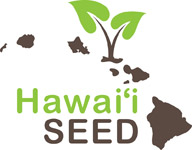-
Join us in Hilo & Honolulu for “Protecting the Sacred” talks!
Posted on May 20, 2018 by SEED-admin in Events Please join Hawaiʻi SEED in Hilo on May 24th and Honolulu on May 25th for exciting conversations examining the threat of Extreme Genetic Engineering to Hawaiian biodiversity and traditional cultural practices (see poster for details). We are welcoming UC Berkeley’s Dr. Ignacio Chapela, who will be sharing his insight on several issues including sovereignty over genetic resources, unregulated Extreme genetic engineering proposals, and his involvement in the debate on the economic and social consequences of biodiversity loss. Joining him are two locally and internationally respected Hawaiian educators and cultural practitioners, Malia Nobrega-Olivera and Dr. Ku Kahakalau. Together they will discuss the challenges new genetic engineering proposals pose to the Islands’ biodiversity and Hawaiian cultural practices and sovereignty. Both events are free, and complimentary locally sourced organic food will be served.
Please join Hawaiʻi SEED in Hilo on May 24th and Honolulu on May 25th for exciting conversations examining the threat of Extreme Genetic Engineering to Hawaiian biodiversity and traditional cultural practices (see poster for details). We are welcoming UC Berkeley’s Dr. Ignacio Chapela, who will be sharing his insight on several issues including sovereignty over genetic resources, unregulated Extreme genetic engineering proposals, and his involvement in the debate on the economic and social consequences of biodiversity loss. Joining him are two locally and internationally respected Hawaiian educators and cultural practitioners, Malia Nobrega-Olivera and Dr. Ku Kahakalau. Together they will discuss the challenges new genetic engineering proposals pose to the Islands’ biodiversity and Hawaiian cultural practices and sovereignty. Both events are free, and complimentary locally sourced organic food will be served.Bios of Speakers
Dr. Ignacio Chapela is associate professor of microbial ecology at the University of California at Berkeley and senior scientist at the Norwegian Center for Biosafety. Since 1996, he has advised national governments and multilateral institutions on policy-making on genetic engineering and sovereignty over genetic resources. He assists indigenous organizations and NGOs in Latin America and elsewhere to meet challenges related to genetic engineering. He has held various research posts in the UK, Switzerland, Norway, and the United States. In addition to his work on microbial ecology he has also engaged in research on the access, ownership and stewardship of genetic resources. Dr. Chapela also served on the US National Academy of Sciences’ Special Committee on the Environmental Impacts of Transgenic Crops.
Dr. Kū Kahakalau is an award-winning native Hawaiian educator, song-writer, story teller, researcher, grassroots activist, cultural practitioner, expert in Hawaiian language, history and culture, and international lecturer and consultant. For the past 20 years, Dr. Kahakalau has been on the forefront of Indigenous education and research worldwide, developing an Indigenous methodology called Mā’awe Pono, grounded in a Hawaiian worldview.
Malia Nobrega-Olivera is from Hanapēpē Valley, Kona, Kauaʻi. She is currently the Hawaiʻinuiākea School of Hawaiian Knowledge Director of Strategic Partnerships and Community Engagement and also the Director of a program called Loli Aniau, Makaala Aniau (LAMA) (Climate Change, Climate Alert). Malia is a Native Hawaiian educator, kumu hula, salt maker, cultural practitioner, film maker, community organizer, and advocate of indigenous rights at all levels-locally, regionally, and internationally. Her experiences demonstrate her commitment to her people, language, and culture and to indigenous peoples worldwide. Ms. Nobrega-Olivera’s advocacy work has taken her to various international meetings such as the United Nations Convention on Biological Diversity and the United Nations Framework Convention on Climate Change.




